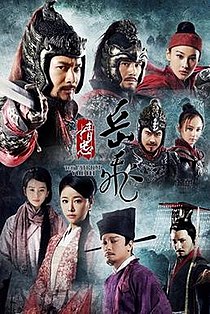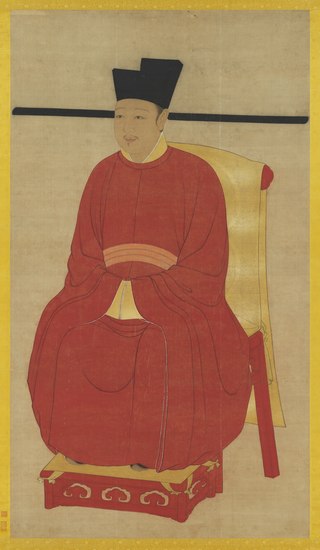
Emperor Huizong of Song, personal name Zhao Ji, was the eighth emperor of the Song dynasty of China and the penultimate emperor of the Northern Song dynasty. He was also a very well-known painter, poet and calligrapher. Born as the 11th son of Emperor Shenzong, he ascended the throne in 1100 upon the death of his elder brother and predecessor, Emperor Zhezong, because Emperor Zhezong's only son died prematurely. He lived in luxury, sophistication and art in the first half of his life. In 1126, when the Jurchen-led Jin dynasty invaded the Song dynasty during the Jin–Song Wars, Emperor Huizong abdicated and passed on his throne to his eldest son, Zhao Huan while Huizong assumed the honorary title of Taishang Huang. The following year, the Song capital, Bianjing, was conquered by Jin forces in an event historically known as the Jingkang Incident. Emperor Huizong and Emperor Qinzong and the rest of their family were taken captive by the Jurchens and brought back to the Jin capital, Huining Prefecture in 1128. The Emperor Taizong of Jin, gave the former Emperor Huizong a title, Duke Hunde, to humiliate him. After Zhao Gou, the only surviving son of Huizong to avoid capture by the Jin, declared himself as the dynasty's tenth emperor as Emperor Gaozong, the Jurchens used Huizong, Qinzong, and other imperial family members to put pressure on Gaozong and his court to surrender. Emperor Huizong died in Wuguocheng after spending about nine years in captivity. He, along with his successors, were blamed for the Song dynasty's decline.
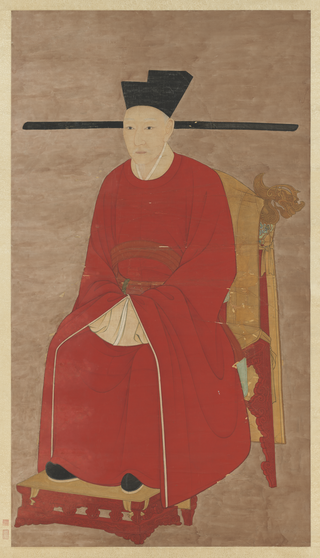
Emperor Gaozong of Song, personal name Zhao Gou, courtesy name Deji, was the tenth emperor of the Chinese Song dynasty and the first of the Southern Song dynasty, ruling between 1127 and 1162 and retaining power as retired emperor from 1162 until his death in 1187. The ninth son of Emperor Huizong and a younger half-brother of Emperor Qinzong, Zhao Gou was not present in the capital of Bianjing when it fell to the Jurchen-led Jin dynasty in 1127 during the beginning of the Jin-Song Wars. Narrowly avoiding capture by Jin forces, he escaped first to Yangzhou and then Lin'an, assuming the throne and reestablishing the Song court. Despite initial setbacks, including Jin invasions and a brief deposition in 1129, Emperor Gaozong consolidated his political position and presided over the continued military conflict with Jin. Prior to 1141, military commanders including Han Shizhong and Yue Fei reconquered portions of the Central Plains while chancellors like Lü Yihao, Zhao Ding, Zhang Jun, and Qin Hui managed the civil bureaucracy.
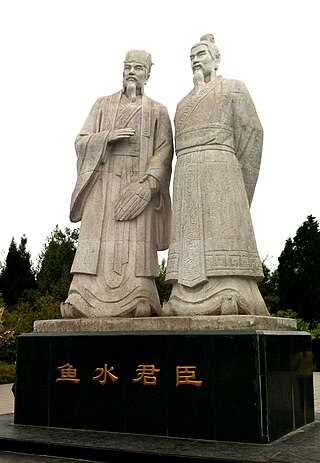
The grand chancellor, also translated as counselor-in-chief, chancellor, chief councillor, chief minister, imperial chancellor, lieutenant chancellor and prime minister, was the highest-ranking executive official in the imperial Chinese government. The term was known by many different names throughout Chinese history, and the exact extent of the powers associated with the position fluctuated greatly, even during a particular dynasty.

The Emperor in Han Dynasty, also released under the title The Emperor Han Wu in some countries, is a 2005 Chinese historical drama television series based on the life of Emperor Wu of the Han dynasty. It uses the historical texts Records of the Grand Historian and Book of Han as its source material.

Romance of the Three Kingdoms is a Chinese television series adapted from the classical 14th century novel of the same title by Luo Guanzhong. The series was produced by China Central Television (CCTV) and was first aired on the network in 1994. It spanned a total of 84 episodes, each approximately 45 minutes long. One of the most expensive television series produced at the time, the project cost 170 million yuan. It was completed over four years and involved over 400,000 cast and crew members, including divisions of the People's Liberation Army from the Beijing, Nanjing and Chengdu military regions. Some of the dialogue spoken by characters was adapted directly from the novel. Extensive battle scenes, such as the battles of Guandu, Red Cliffs and Xiaoting, were also live-acted.

Qin Hui or Qin Kuai was a Chinese politician. He was a Chancellor of the Song dynasty in Chinese history.

The Prince of Han Dynasty is a three-season Chinese television series featuring a fictionalised life story of Liu Che, Emperor Wu of the Han Dynasty. Season 1 was first broadcast on Beijing Television in 2001 in mainland China, followed by the second and third seasons in 2003 and 2005 respectively. Except for Huang Xiaoming, who played Emperor Wu in all three seasons, the cast members in each season are almost different from its preceding one.

Three Kingdoms is a 2010 Chinese television series based on the events in the late Eastern Han dynasty and the Three Kingdoms period. The plot is adapted from the 14th century historical novel Romance of the Three Kingdoms and other stories about the Three Kingdoms period. Directed by Gao Xixi, the series had a budget of over 160 million RMB and took five years of pre-production work. Shooting of the series commenced in October 2008, and it was released in China in May 2010.

Royal Tramp is a 2008 Chinese television series adapted from Louis Cha's novel The Deer and the Cauldron. Produced by Zhang Jizhong and Huayi Brothers, the series consists of 50 episodes, filmed in high definition. The series was first broadcast on Jiangsu TV in China in 2008 and was subsequently aired on TVB in Hong Kong and other countries.
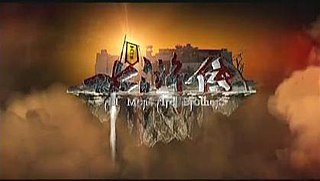
All Men Are Brothers is a 2011 Chinese television series adapted from Shi Nai'an's 14th century novel Water Margin, one of the Four Great Classical Novels of Chinese literature. The series is directed by Kuk Kwok-leung and features cast members from mainland China, Taiwan and Hong Kong. The series was first broadcast on 8TV in March 2011 in Malaysia.

The Battle of Yancheng took place in 1140 near modern-day Luohe City in Henan Province, China between the main armies of China under the Song dynasty and the Jurchen Jin invaders from the north. The battle was a major clash in the wars between the Jin Empire and China. The Chinese forces, under the leadership of General Yue Fei, won a decisive victory despite being outnumbered.

Wu Zetian is a Chinese television series based on the life of Wu Zetian, the only woman in Chinese history to assume the title of Empress Regnant and became the de facto ruler of China in the late seventh century. Directed by Chen Jialin, the series starred Liu Xiaoqing as the title character. It was first broadcast on CCTV in China in 1995 and subsequently aired by television stations in other countries.
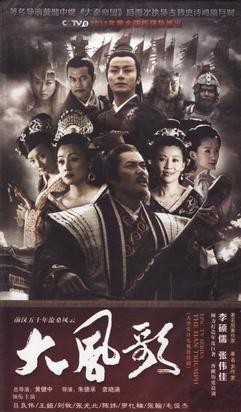
The Han Triumph, also known as Wind Ode, is a Chinese television series based on historical events in the early Han dynasty, beginning with the founding of the dynasty by Liu Bang after his triumph over Xiang Yu, and the events leading to the reign of Liu Heng. Directed by Huang Jianzhong, the series starred Ray Lui, Wang Ji, Liu Mu, Zhang Guangbei, Chen Wei and Li Qingxiang in the leading roles. It was first broadcast on CCTV-8 in China on 17 December 2011.

Tang Ming Huang is a Chinese television series based on historical events in the reign of Emperor Xuanzong of the Tang dynasty. The series was directed by Chen Jialin and starred Liu Wei as the eponymous emperor. It was first broadcast on CCTV-1 in 1990 in mainland China.

Eight Thousand Li of Cloud and Moon is a Taiwanese television series based on the life of Yue Fei, a Song dynasty general widely regarded as a patriot and national hero in Chinese culture for his role in the Jurchen campaigns against the Song dynasty. The Chinese title of the series comes from a line in Man Jiang Hong, a patriotic poem commonly attributed to Yue Fei. The series was first aired on CTS in Taiwan from 21 November 1988 to 13 January 1989.

The Jin–Song Wars were a series of conflicts between the Jurchen-led Jin dynasty (1115–1234) and the Han-led Song dynasty (960–1279). In 1115, Jurchen tribes rebelled against their overlords, the Khitan-led Liao dynasty (916–1125), and declared the formation of the Jin. Allying with the Song against their common enemy the Liao dynasty, the Jin promised to cede to the Song the Sixteen Prefectures that had fallen under Liao control since 938. The Song agreed but the Jin's quick defeat of the Liao combined with Song military failures made the Jin reluctant to cede territory. After a series of negotiations that embittered both sides, the Jurchens attacked the Song in 1125, dispatching one army to Taiyuan and the other to Bianjing, the Song capital.
The Battle of Huangtiandang was an early battle in the Jin–Song Wars. From 1129, the Jin forces led by Wuzhu marched southward, successively conquering several important cities north of the Yangtze River. Wuzhu sent forces to chase after the Song court, but was ambushed by Song forces led by Han Shizhong and Liang Hongyu at Huangtiandang, northeast of today's Nanjing city. The Jin army was trapped there for 48 days, but finally was able to retreat on the suggestion of a Song resident.

Su Dongpo is a 2012 Chinese historical TV series produced by China Central Television. It was first shown in 2012, although it was filmed in 2007.
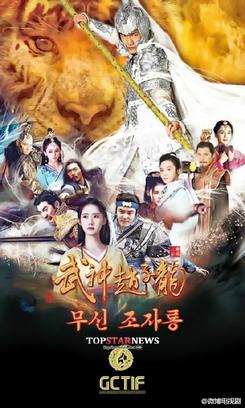
God of War, Zhao Yun, also known as Chinese Hero Zhao Zilong, released under the title Dynasty Warriors in Indonesia, is a 2016 Chinese television series directed by Cheng Lidong and produced by Zhejiang Yongle Entertainment Co., Ltd. The series starred cast members from mainland China, South Korea and Taiwan: Lin Gengxin, Im Yoon-ah and Kim Jeong-hoon. The story is loosely adapted from the 14th-century Chinese classical novel Romance of the Three Kingdoms, with Zhao Yun as the main character. It was first aired on Hunan TV from 3 April to 7 May 2016.
